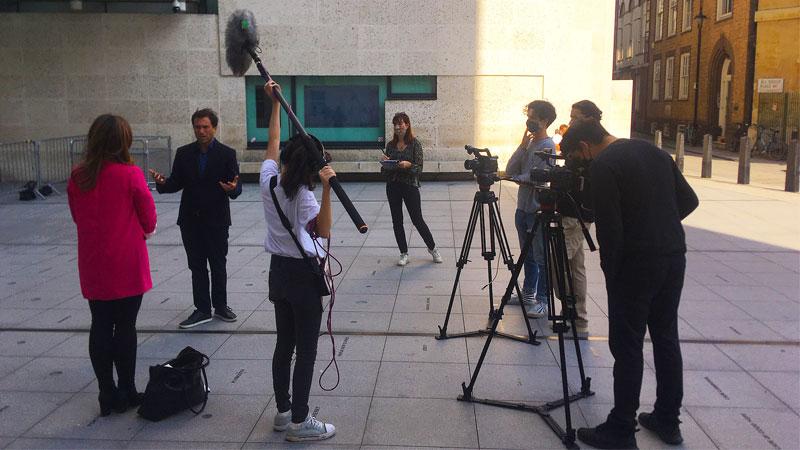This summer, students from the Film BA Honours course collaborated with the BBC on the new expansion of the 50:50 Project, a collective action initiative committed to supporting the BBC and other organisations to consistently create media content that fairly represents our world.

Students were invited to present a paper and virtual pitch for 50:50 to learn more about representation and have their work be published by the BBC. The winning team were invited to create a series three short videos for the project that tell the story of 50:50 so far and where they can take it next, which have been published by the BBC today.
Olivia Otts (Producer), Miquel Sierra Altarriba (Director), Mariia Brega (Writer), Miguel Cidad Pinero (Director of Photography), Angelica Bizzotto (Camera Operator), Ben Rolph (Graphics), Tuana Yalcinkaya (Editor), Ingrid Ho (Sound Recordist/Editor) and Isabel Mejia (Production Design) from the University of Westminster were part of the winning team chosen to produce the materials for the project.
The students worked with BBC News journalists Bryony Hopkins and Ameer Ahmed, who fronted the films. They alongside, other BBC News journalists, oversaw the students’ work on the filming, scripting, editing, graphics, sound, production and photography for the videos. The BBC’s 50:50 team also connected the students with interviewees, stakeholders and partners who appear in the content.
50:50 started as a grassroots initiative in the BBC newsroom, which utilises data, creativity, practicality and passion to shift representation within the media. Since launching three years ago, 50:50 has partnered with a number of organisations and universities to help achieve their mission, including the University of Westminster.
Guided by BBC Director-General Tim Davie’s diversity targets for Black, Asian and Minority Ethnic and disability representation, BBC teams will look to build on the success of the Project and will now strive to include more diverse voices and contributors to better reflect the audiences the BBC serves. The BBC is also calling on its programme makers to expand the successful 50:50 Project methodology to monitoring disability and ethnicity representation.
Talking about her experience creating the videos for 50:50, Producer Olivia Otts said: “Having the opportunity to produce a series of videos for 50:50 has been enlightening for me not only as an experience in managing teams and logistics, but also as an insight into the social progress that is propelling the media industry into the future.
“As a future filmmaker and journalist, the social progress that I have seen with this initiative is a concrete representation of what is becoming possible for the upcoming careers of our whole team. I am so proud of everyone who worked tremendously well to pull these promotional videos together, and cannot wait to see the impact that they create.”
Nina Goswami, BBC Creative Diversity Lead for 50:50, said: “At the heart of 50:50 is ensuring that we create improved representation on media content for the long-term. Working with the University of Westminster and our academic partners is crucial to this and why we wanted to pilot the 50:50 Pitch. We wanted to give students the opportunity to understand why the BBC and 50:50 believe so passionately about improving representation, while showcasing the skills of new and upcoming talent. The University of Westminster team were fantastic and why we were pleased to publish and output on BBC platforms. The success of the first 50:50 Pitch means we’re definitely looking to run the process again – so more to follow soon.”


